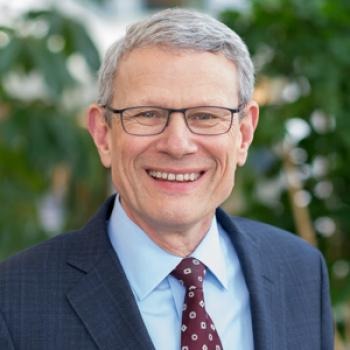Paul K. Kearns
Argonne National Laboratory
Laboratory Director
Paul K. Kearns has served as Director of the U.S. Department of Energy (DOE) Argonne National Laboratory since 2017. Argonne is a growing multidisciplinary science and engineering research center with a $1.2 billion diversified research portfolio and more than 3,300 employees, 8,000 facility users, and 800 visiting researchers. Kearns has set the laboratory’s strategic vision to deliver pivotal discoveries, pioneering leadership, and powerful scientific tools and facilities. He has strengthened sponsor relationships and fostered a welcoming and inclusive culture valuing diversity, innovation and collaboration, and laboratory impact. A biologist and accomplished steward of diverse scientific resources, Kearns has managed complex research and development enterprises for over 30 years, enabling them to achieve ambitious goals in energy, environment, and national security. As Argonne laboratory director, Kearns oversees multiple projects critical to Argonne’s mission of accelerating science and technology to drive U.S. prosperity and security. Upgrading the Advanced Photon Source and launching the first exascale computer in the U.S. at the Argonne Leadership Computing Facility are critical to maintain U.S. leadership in science and technology. Argonne’s leadership of the Joint Center for Energy Storage Research reflects the laboratory’s long history of battery science expertise and collaboration. As Argonne chief operations officer from 2010 to 2017, Kearns directed over 900 staff providing mission support services in financial management, human resources, safety performance, business systems, technology commercialization, and facilities management. Kearns also guided the establishment of an independent energy storage start-up and directed construction of cutting-edge research laboratories. Kearns was an executive with Battelle Global Laboratory Operations for five years prior to joining Argonne. Kearns helped establish a groundbreaking program to deploy micro-grids and support cyber security technologies for the U.S. military. He worked with the University of Manchester, the United Kingdom’s National Nuclear Laboratory, and the United Kingdom Technical Strategy Board to define a research and development investment strategy in nuclear energy. As President and Managing Director of Battelle-Italia, Kearns implemented an integrated business plan for Battelle Memorial Institute subsidiary working with the government of Italy and industry to address energy, security and environmental challenges. Kearns’ stewardship of DOE resources includes accomplished tenures with the Idaho National Engineering and Environmental Laboratory (INEEL) and Pacific Northwest National Laboratory (PNNL) between 1995 and 2005. He helped develop technical and contracting strategies for high-level radioactive waste processing by the Hanford Tank Waste Remediation System and managed an award-winning PNNL staff conducting R&D activities for public and private sector clients in chemical, thermal, electrochemical, and radiochemical processing. At INEEL, Kearns oversaw the laboratory’s program in energy, environment, and national security, including the Advanced Test Reactor and Specific Manufacturing Capability Tank Armor Production Facility. Kearns is a fellow of the American Association for the Advancement of Science. He serves on the Executive Committee of the DOE National Laboratory Directors’ Council and the U.S. Council on Competitiveness’ National Commission on Innovation and Competitiveness Frontiers. He was also recently named Director of the Year by the Federal Laboratory Consortium and was appointed chair of the National Lab Directors’ Council. Kearns has a doctorate and a master’s degree in bionucleonics and bachelor’s degree in natural resources and environmental sciences, all from Purdue University. He and his wife, Lynn Kearns, have three children and four grandchildren.

